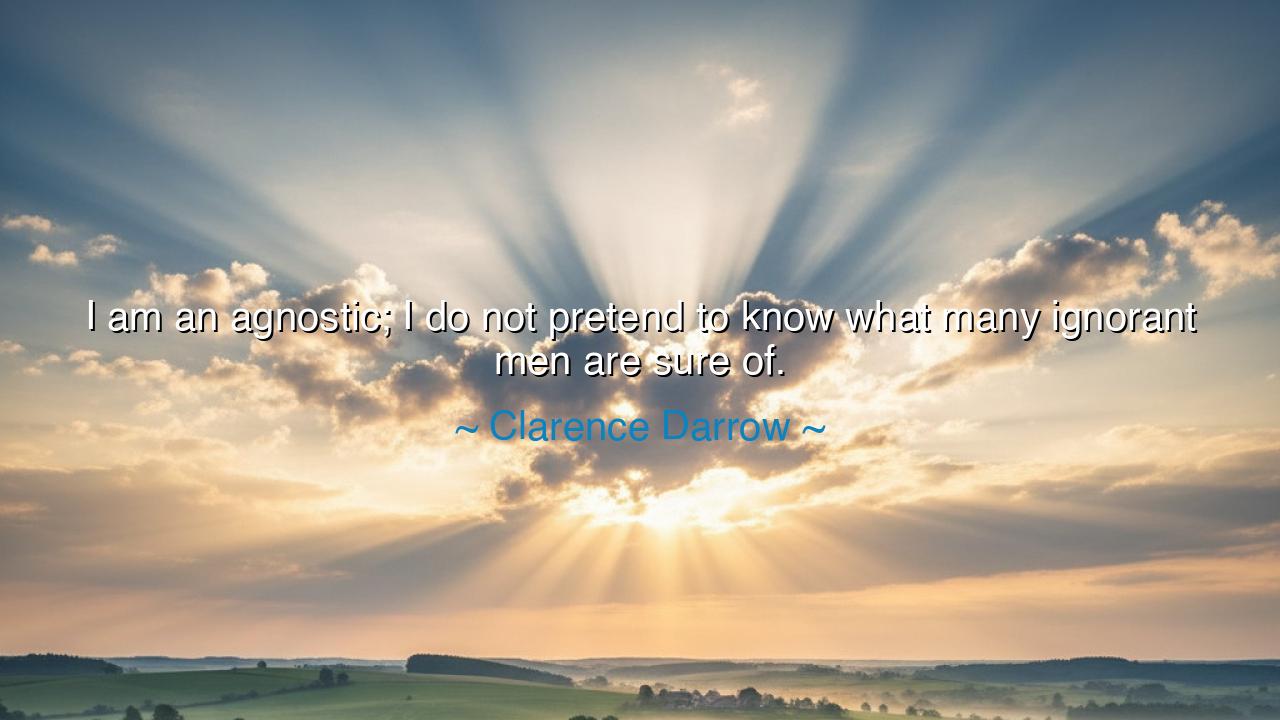
I am an agnostic; I do not pretend to know what many ignorant men






When Clarence Darrow declared, “I am an agnostic; I do not pretend to know what many ignorant men are sure of,” he spoke with the voice of reason tempered by humility. Darrow, one of the most eminent lawyers of the early twentieth century, was renowned for his defense of the Scopes “Monkey” Trial and his broader commitment to rational inquiry. In this statement, he acknowledges the limits of human knowledge, especially in matters as profound as the divine, the universe, and the ultimate truths of existence. His words remind us that true wisdom begins with the recognition of what one does not know, and that certainty is not synonymous with truth.
The ancients would have recognized Darrow’s sentiment immediately. Socrates, the father of philosophical inquiry, claimed, “I know that I know nothing,” emphasizing that the acknowledgment of ignorance is the foundation of genuine knowledge. Similarly, the Stoics taught that a man’s strength lies not in claiming absolute understanding, but in the constant pursuit of clarity and virtue. Darrow’s agnosticism mirrors this ancient ethos: it is not a rejection of belief, but a disciplined restraint from claiming knowledge that exceeds human capacity.
Darrow’s insight is both intellectual and moral. Many men, he observes, are confident in matters they scarcely understand — projecting certainty where none is justified. Such arrogance, whether in religion, politics, or science, can lead to conflict, oppression, and folly, as history has repeatedly shown. By contrast, the agnostic posture is one of caution, reflection, and openness. It respects the mystery of existence, acknowledging that some truths may forever elude human comprehension. In this way, Darrow elevates intellectual humility as a virtue necessary for ethical and rational life.
Consider the life of Galileo Galilei, who dared to question the prevailing geocentric cosmology of his time. Many contemporaries were convinced of their absolute knowledge of the heavens, condemning dissenting voices as heretical. Galileo, though confident in his observations, recognized the limits imposed by incomplete understanding and the interpretive frameworks of his society. Darrow’s statement reflects a similar awareness: the wise do not claim certainty lightly, for the world is vast and knowledge provisional. Humility safeguards reason and encourages the search for truth without presumption.
Darrow’s words also speak to the courage of intellectual honesty. It is easier to conform, to speak with authority without understanding, to claim certainty as others do. Yet such pretense erodes the soul and corrupts discourse. The agnostic path requires resisting this temptation — acknowledging uncertainty while engaging earnestly in inquiry. Like Socrates engaging the citizens of Athens, Darrow models a life in which honesty and humility coexist with courage and moral commitment, even in the face of social pressure.
History offers further illustration in the work of Charles Darwin. Though he revolutionized the understanding of life, Darwin did not claim absolute knowledge; he presented his theory with careful observation and acknowledgment of its provisional nature. He resisted the arrogance of claiming ultimate truth, leaving room for continued exploration and debate. Darrow’s agnosticism embodies this same respect for the limits of human understanding: to admit ignorance is not weakness, but a recognition of reality and a call to continued study.
The lesson of Darrow’s reflection is both practical and spiritual. In life, we will encounter claims of certainty on matters vast and complex — in religion, science, politics, and philosophy. The path of wisdom is to listen, question, and examine, but to resist the temptation of false certainty. By cultivating intellectual humility, one fosters both clarity of thought and moral integrity, avoiding the arrogance that has led many to error, injustice, and conflict.
So, O listener, carry Darrow’s insight into your daily life: acknowledge the limits of your knowledge, speak cautiously when confronted with the unknown, and pursue truth with diligence and humility. Recognize that certainty, when unearned, can blind and mislead, whereas thoughtful restraint fosters wisdom, compassion, and the enduring capacity to learn. In the delicate balance between knowledge and mystery lies the strength of the mind and the virtue of the soul.






AAdministratorAdministrator
Welcome, honored guests. Please leave a comment, we will respond soon